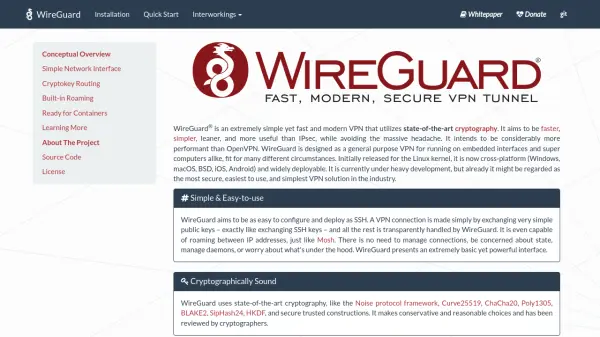What is WireGuard?
WireGuard is a contemporary VPN solution designed to offer robust security and high performance by utilizing advanced cryptographic techniques. Developed to be fundamentally simpler and more efficient than legacy protocols like IPsec and OpenVPN, WireGuard is easily deployable across multiple operating systems including Linux, Windows, macOS, iOS, Android, and BSD. Its architecture is streamlined for straightforward deployment, with configuration that mirrors the simplicity of SSH key exchange, minimizing the complexity typically associated with VPN setup and management.
WireGuard focuses on minimal codebase for enhanced auditability, excellent performance due to tight kernel integration, and ease of use via a basic interface for creating and managing encrypted tunnels. The protocol supports built-in IP roaming to maintain connectivity during IP changes, and its cryptokey routing provides secure and straightforward access control. Suited for both individual and enterprise environments, WireGuard ensures secure networking with an emphasis on simplicity and reliability.
Features
- Advanced Cryptography: Utilizes modern frameworks such as Noise, Curve25519, and ChaCha20 for strong encryption.
- Cross-Platform Compatibility: Available for Linux, Windows, macOS, BSD, iOS, and Android.
- High Performance: Runs within the Linux kernel and uses efficient cryptographic primitives.
- Simple Configuration: VPN setup via easy public key exchange similar to SSH.
- Cryptokey Routing: Associates public keys with allowed IPs for streamlined authentication and routing.
- Built-in Roaming: Seamlessly maintains connections as client or server IP addresses change.
- Minimal Attack Surface: Designed for ease of implementation and security auditability.
- Container Ready: Easily integrates with Docker and other containers for secure networking.
- IPv4/IPv6 Support: Capable of handling both IP versions, including encapsulation.
Use Cases
- Securing remote work communications over public or untrusted networks.
- Enabling encrypted connections between data centers or cloud servers.
- Providing secure access to corporate networks for employees using laptops and mobile devices.
- Allowing safe remote administration of servers and routers.
- Establishing secure tunnels for containers and virtual machines.
- Protecting user privacy on public Wi-Fi hotspots.
- Facilitating site-to-site VPN connectivity for enterprise infrastructure.
FAQs
-
What operating systems does WireGuard support?
WireGuard is cross-platform and supports Linux, Windows, macOS, BSD, iOS, and Android. -
What cryptographic protocols does WireGuard use?
WireGuard uses state-of-the-art cryptography including the Noise protocol framework, Curve25519, ChaCha20, Poly1305, BLAKE2, SipHash24, and HKDF. -
How does WireGuard configure VPN tunnels?
WireGuard configures VPN tunnels through a simple exchange of public keys, similar to SSH key management, with configuration files specifying keys and allowed IP addresses. -
Is WireGuard suitable for containerized environments?
Yes, WireGuard is ready for containers and can be used to securely tunnel network traffic for Docker containers and similar environments. -
What license does WireGuard use?
WireGuard's kernel components are released under GPLv2, while other components may use MIT, BSD, Apache 2.0, or GPL depending on context.
Related Queries
Helpful for people in the following professions
WireGuard Uptime Monitor
Average Uptime
100%
Average Response Time
105.83 ms
Featured Tools
Join Our Newsletter
Stay updated with the latest AI tools, news, and offers by subscribing to our weekly newsletter.










